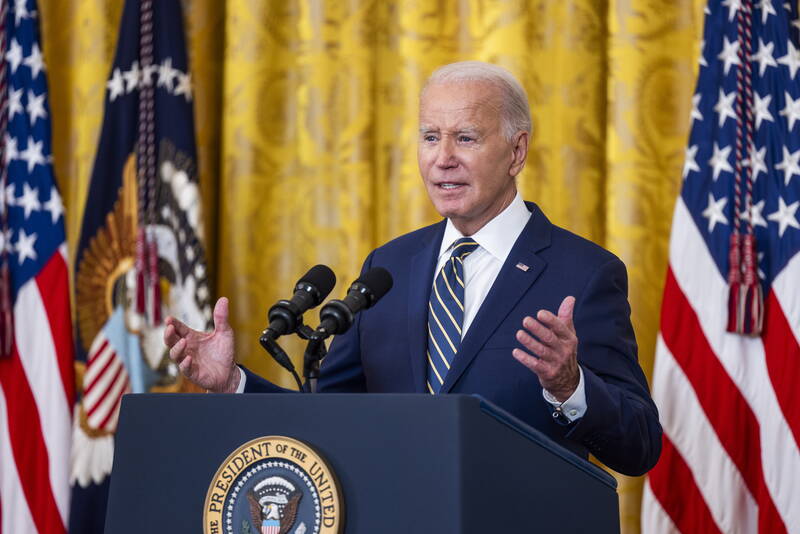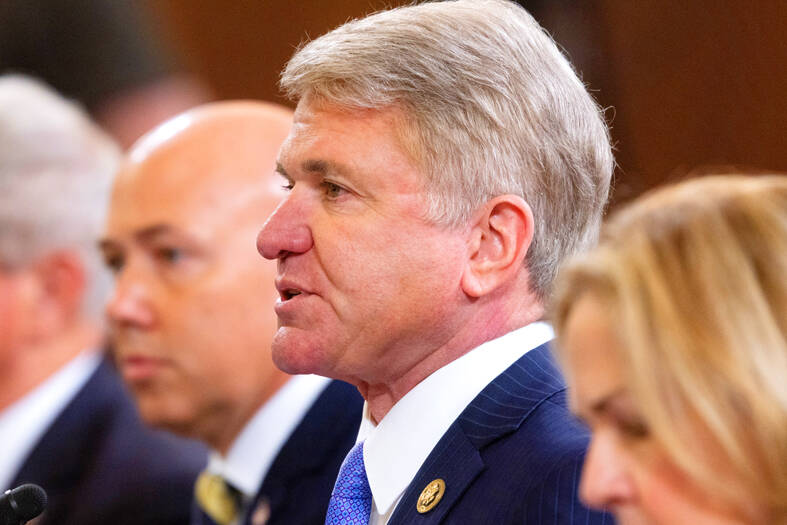Taiwan yesterday thanked the US for approving a military transfer of US$80 million under the Foreign Military Financing (FMF) program which, foreign media said, is normally used for sovereign states.
The US Department of State on Wednesday notified the US Congress of the aid, saying that the items provided through the FMF would “be used to strengthen Taiwan’s self-defense capabilities through joint and combined defense capability and enhanced maritime domain awareness and maritime security capability,” The Associated Press (AP) reported yesterday.
After years of assisting Taiwan through its Foreign Military Sales program, this is the first time the US is providing military aid under the FMF to Taiwan.

Photo: EPA
The transfer is part of the Omnibus Consolidated Appropriations Act, which US President Joe Biden signed in December, that allows up to US$2 billion in direct loans to Taiwan for military purposes.
The AP said that although the package is “modest” in amount, “the implications of using the so-called Foreign Military Financing program to provide it will likely infuriate China.”
“FMF simply enables eligible partner nations to purchase US defense articles, services, and training through either Foreign Military Sales or, for a limited number of countries, through the foreign military financing of direct commercial contracts program,” The AP quoted two US officials as saying on condition of anonymity.

Photo: EPA-EFE
The language used in the aid “implied that Taiwan is or could be compared to a ‘nation’ or a ‘country,’” The AP said, adding that the only other time the US has provided military assistance under the FMF to a non-nation-state was to the African Union.
A State Department spokesperson told the Central News Agency that the aid is in compliance with the Taiwan Relations Act (TRA) and the US’ long-held “one China” policy remains unchanged.
US Representative Michael McCaul, chairman of the US House of Representatives Committee on Foreign Affairs, issued a statement on Wednesday saying that he was glad the Biden administration decided to provide the aid to Taiwan.
“These weapons will not only help Taiwan and protect other democracies in the region, but also strengthen the US’ deterrence posture and ensure our national security from an increasingly aggressive CCP,” he said, referring to the Chinese Communist Party.
The notification provided to the US Congress said that the items that would be paid for under FMF might include: air and coastal defense systems, armored vehicles, infantry fighting vehicles, drones, ballistic missile and cyber defenses, and advanced communications equipment, The AP said.
The fund might also be used to pay for protective gear, an array of small, medium and heavy weapons systems, ammunition, armored and infantry fighting vehicles, as well as training for Taiwanese military forces, it said.
The package followed the military assistance of US$345 million provided by the US to Taiwan in July through the Presidential Drawdown Authority that the US Congress authorized last year and the US$500 million arms sale package, which includes F-16 Infrared Search and Track systems, to the nation earlier this month.
The Ministry of Foreign Affairs and the Ministry of National Defense thanked the US for helping Taiwan strengthen its self-defense capabilities based on the TRA and the “six assurances.”

CHAOS: Iranians took to the streets playing celebratory music after reports of Khamenei’s death on Saturday, while mourners also gathered in Tehran yesterday Iranian Supreme Leader Ayatollah Ali Khamenei was killed in a major attack on Iran launched by Israel and the US, throwing the future of the Islamic republic into doubt and raising the risk of regional instability. Iranian state television and the state-run IRNA news agency announced the 86-year-old’s death early yesterday. US President Donald Trump said it gave Iranians their “greatest chance” to “take back” their country. The announcements came after a joint US and Israeli aerial bombardment that targeted Iranian military and governmental sites. Trump said the “heavy and pinpoint bombing” would continue through the week or as long

TRUST: The KMT said it respected the US’ timing and considerations, and hoped it would continue to honor its commitments to helping Taiwan bolster its defenses and deterrence US President Donald Trump is delaying a multibillion-dollar arms sale to Taiwan to ensure his visit to Beijing is successful, a New York Times report said. The weapons sales package has stalled in the US Department of State, the report said, citing US officials it did not identify. The White House has told agencies not to push forward ahead of Trump’s meeting with Chinese President Xi Jinping (習近平), it said. The two last month held a phone call to discuss trade and geopolitical flashpoints ahead of the summit. Xi raised the Taiwan issue and urged the US to handle arms sales to

BIG SPENDERS: Foreign investors bought the most Taiwan equities since 2005, signaling confidence that an AI boom would continue to benefit chipmakers Taiwan Semiconductor Manufacturing Co’s (TSMC, 台積電) market capitalization swelled to US$2 trillion for the first time following a 4.25 percent rally in its American depositary receipts (ADR) overnight, putting the world’s biggest contract chipmaker sixth on the list of the world’s biggest companies by market capitalization, just behind Amazon.com Inc. The site CompaniesMarketcap.com ranked TSMC ahead of Saudi Aramco and Meta Platforms Inc. The Taiwanese company’s ADRs on Tuesday surged to US$385.75 on the New York Stock Exchange, as strong demand for artificial intelligence (AI) applications led to chip supply constraints and boost revenue growth to record-breaking levels. Each TSMC ADR represents

Pro-democracy media tycoon Jimmy Lai’s (黎智英) fraud conviction and prison sentence were yesterday overturned by a Hong Kong court, in a surprise legal decision that comes soon after Lai was jailed for 20 years on a separate national security charge. Judges Jeremy Poon (潘兆初), Anthea Pang (彭寶琴) and Derek Pang (彭偉昌) said in the judgement that they allowed the appeal from Lai, and another defendant in the case, to proceed, as a lower court judge had “erred.” “The Court of Appeal gave them leave to appeal against their conviction, allowed their appeals, quashed the convictions and set aside the sentences,” the judges